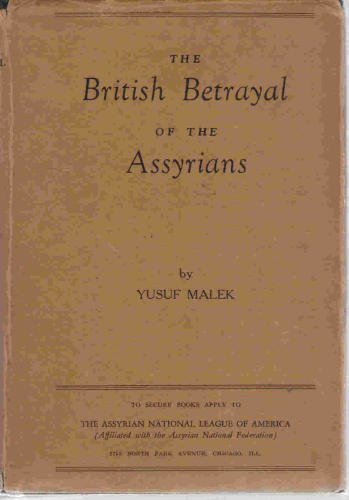Yusuf Malek (1899-1959)Posted: Tuesday, July 03, 2001 at 11:25 AM CT
Became the personal assistant for the governor in Samara’a, Baghdad, Rumadi then in Mosul. He was nominated for the position of qa’imaqam (mayor) of Shikhan, but he refused the position preferring to go from town to town and fight in defense of the oppressed within the Assyrians. Was forced to flee to Aleppo, Syria, then to Beirut, Lebanon, because the Iraqi government forces started to chase him. In Beirut, he published in 1932 his first book “Fawajia Al-Intidab Fi Hikomat Al-Iraq” (The mandates tragedy in the Iraqi governments). Patriarch Mar Eshai Shimun, bless his soul, on a stop in Damascus, while on his way back to Baghdad from Geneva, in December 1932, met with Yusuf Malek. Yusuf Malek began to write in the Lebanese Newspapers about what was going on inside Iraq during the 1933 Simmel massacres, it was because of his critics that he was exiled to Cyprus. In Cyprus, he met again with the exiled Assyrian Patriarch Mar Eshai Shimun, and together they prepared the Assyrian case which was presented to the League of Nations. He packed his bags and traveled to Geneva with the Mar Shimun in late September 1933. It was at this time and place where he finished his second book “The British Betrayal of the Assyrians”.
Many efforts were made by Yusuf Malek’s friends in Lebanon to permit him to return to Beirut. Those efforts finally succeeded to convince the Lebanese Government, and Malek returned to Beirut in October 8th, 1934. In June 15th, 1938, he publishes “Athra“ or “Homeland” in Assyrian, Arabic, English and French languages. He was imprisoned for eight days in September 3rd, 1941 by the French authorities for standing against the occupation of Lebanon. Malek made friendship with Husni Al-ZaAeem while they were both in prison as political prisoners, later when Husni Al-ZaAeem became president of Syria, Yusuf went to Damascus to congratulate him. The new president promised that he will work hard to find a just solution for the Assyrians of Khabor, but then the Syrian president was assassinated before having a chance to do anything about the Assyrian question. In May 15th, 1956 he reaches an understanding with the publisher of the “Al-Wijdan” or “The Consciousness,” to publish special issues containing views of condemnation to the policies of the British and the French, their mandates and the injustice and oppression they had committed against all the Middle Eastern nations. In January 18th, 1957, he issued his weekly political newspaper “Al-Hurriya” or “Freedom”. Yusuf Malek passed away in Beirut on Friday, June 26th, 1959, at 6:00 PM at the age of sixty. It was as if that al-Mutanabbi, the famous Arab poet, was talking about Yusuf Malek when he wrote:
Introduction to his work
In Fond Memory of a Genius in the Service of the Assyrians; Yusuf Malek Muster What shall we say of each in turn |
 He is Yusuf Jajjo Francis Malek, an Assyrian from the Chaldean Catholic Church, born in 1899 in Baghdad, Iraq from a family from Telkaif. Studied in St. Joseph College transferred to Al-Rashidiya School in Basrah after closing the school amid the start of WW1. He later joined the American school there until 1915, when he joined the British army, at a very young age, as a translator.
He is Yusuf Jajjo Francis Malek, an Assyrian from the Chaldean Catholic Church, born in 1899 in Baghdad, Iraq from a family from Telkaif. Studied in St. Joseph College transferred to Al-Rashidiya School in Basrah after closing the school amid the start of WW1. He later joined the American school there until 1915, when he joined the British army, at a very young age, as a translator.